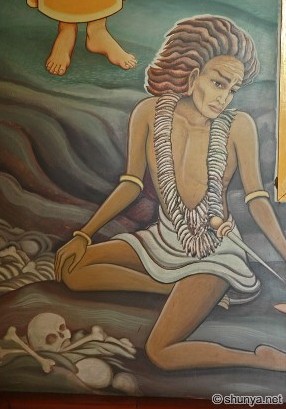by Lodro Rinzler
 Angulimal, photo courtesy of shunya.net
Angulimal, photo courtesy of shunya.net
Before Siddhartha Gautama attained enlightenment at age 35 he was a
confused twenty and thirty-something looking to learn how to live a
spiritual life. He had an overbearing dad, expectations for what he was
supposed to do
with his life, drinks were flowing, lutes were playing, and the
women were all about him. Some called him L.L. Cool S. I imagine
close friends just referred to him as Sid.
Many people look to Siddhartha as an example of someone who attained nirvana, a buddha. But here we look at a younger Sid
as a confused guy struggling with his daily life. What would he do as a
young person trying to find love, cheap drinks, and fun in a city like
New York? How would he combine Buddhism and dating? We all make mistakes on our spiritual journey; here is where
they’re discussed.
Each week I’ll take on a new question and
give some advice based on what I think Sid, a confused guy working on
his spiritual life in a world of major distraction, would do. Because
let’s face it, you and I are Sid.
Have a question for this weekly column? E-mail it here and Lodro will probably get to it!
—————————————————————————————————————————————
I am a single mother raising a young man who is 4 years old. I am 41 and I have been pregnant 3 times. The first I terminated and can NOT forgive myself for. The second was a miscarriage. Everyday I wonder why I am here and how I could have been so selfish as to KILL my child. I love my son, but wonder why I have been given another chance. I have also been VERY self destructive in trying to find forgiveness for my actions. WWSD? – Pretty Girl
Generally speaking in Buddhism it is believed that life starts at the
time of conception. Little in-between realms you sees your parents
having sex, thinks it looks pretty cool, and goes to investigate. At
that point your consciousness has entered the realm and goes about the
process of being born. As such the Buddha taught that abortion is
indeed taking a being’s life which is a grave misdeed.
In our
modern world many Buddhist teachers have said that there are times that
it may not be karmically awful to have an abortion if the child poses a
significant health risk to the mother. Along those lines His Holiness
the Dalai Lama has admitted in an interview with the New York Times
that “…abortion should be approved or disapproved according to each
circumstance.”
Traditional Buddhism may discourage abortion, but
it also discourages imposing rigid moral absolutes. While I suspect Sid
would probably not encourage his partner to have an abortion I doubt he
would deny a woman her right to chose what she should do with her body.
I have to say this is a departure from what I personally would do as
Lodro Rinzler, who is not Sid and may or may not encourage my partner
to get an abortion (although Sid and I agree on the second part). These
are issues I have to reconcile for myself.
Buddhism is such an
individualistic path. I have no idea why you had an abortion and as
such have no right to condemn or praise you (and commenters, please be
kind here: there are real people behind these real questions!). I do
encourage you to contemplate the motivation behind your decision.
Knowing nothing about you whatsoever I will only guess that what you
did was meant to diminish suffering not only for yourself but also for
the child that you would be bringing into the world. If that’s the case
then your intention wasn’t all bad and since the act has occurred
learning to forgive yourself is extremely important.
Dilgo
Khyentse Rinpoche once said, “In the case of an abortion…if the
parents feel remorse they can help by acknowledging it, asking for
forgiveness, and performing ardently the purification practice of
Vajrasattva. They can also offer lights, and save lives, or help
others, or sponsor some humanitarian or spiritual project, dedicating
it to the well-being and future enlightenment of the baby’s
consciousness.” All good options, although I’d say Vajrasattva, a
Tibetan Buddhist purification practice, should be learned from an
authorized teacher. In other words, don’t try this at home. Or through
a book.
I am reminded of the story of the Buddha and Angulimal.
Angulimal was a murderer. A mass murderer. It’s said that he had killed
999 people and wore a necklace of fingers, one from each of his
victims. Still the Buddha went down the road to see him. Angulimal
warned him that if he came any closer the Buddha would be his 1000th
victim.
The Buddha, willing to offer his life to fulfill
Angulimal’s desire to complete his necklace asked only for one last
wish. His desire? For Angulimal to cut a branch from a tree. Angulimal
did so and offered it to the Buddha. Then the Buddha asked him to
reattach it to the tree. When he saw the murderer was confused the
Buddha explained, “If you cannot create, you have no right to destroy.
If you cannot give life, you don’t have the right to give death to any
living thing.”
Angulimal was instantly transformed, put down his
sword and was accepted into the monastic order. He was forgiven by the
Buddha himself for his misdeeds and is said to have died a truly
awakened man.
I mention this story not to equate what you did
with this mass murderer (really and truly) but to point out that even
the harshest and most senseless of acts can and have been forgiven.
Furthermore our largest mistakes serve as the largest fodder for our
path to enlightenment. We learn what aspects of our life we want to
cultivate and which we need to learn to reject. We grow stronger
knowing that we have survived our mistakes and learned from them.
You
mentioned that you have done many self destructive things on your path
towards forgiveness. The fact that you have recognized those things as
destructive is step one. Step two is abandoning those things. Step
three is even harder. Step three is learning new habits, specifically
learning to be with our emotions as they are, be they guilt, anger, or
sadness. To feel our emotions fully is, in my experience, the best road
to forgiving ourselves for our mistakes. I probably sound like a broken
record on this blog but meditation is a valuable tool that enables us
to be present with just these sorts of experiences.
Furthermore,
I think the Buddha’s quote is quite relevant to your situation. At this
point you have given life to a precious being. You can love him and
raise him with a heart full of compassion and understanding. I
personally believe that parenting is a full and rich path that, if done
correctly and if partnered with meditation, can lead to great awakening.
I
wish you tremendous luck on this path towards forgiveness as well as on
your path of parenthood. Learning from our mistakes is a valuable
practice opportunity. Learning to forgive ourselves is even more
valuable. However, learning to be present in the midst of great
confusion or sadness is the bee’s knees. As Acharya Pema Chodron has
said, “This moment is the perfect teacher.”

